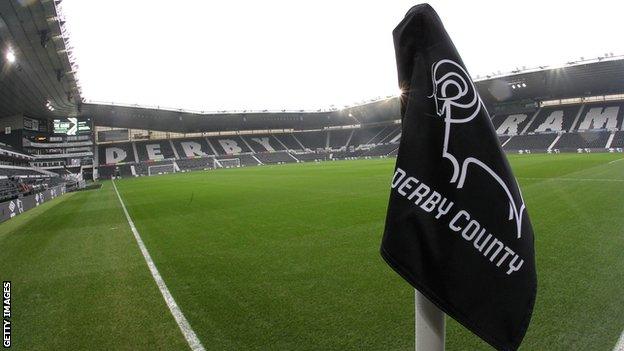Derby County: EFL was warned about unusual player registration model
- Published

Derby have been in the Championship continuously since relegation from the Premier League in 2008
The English Football League was warned about Derby County's unusual player registration model 19 months before it issued financial fair play charges "out of the blue" against the Championship club.
Football finance expert Kieran Maguire wrote to the EFL in June 2018 to "query the accounting policy" undertaken by the club, which he said risked making a "mockery" of FFP rules.
However, BBC Sport understands he was never contacted by the relevant finance team at the EFL, and Derby were not aware there was any issue with the way it accounts for player registration fees.
Last week, however, the EFL announced it had charged the club "for recording losses in excess of the permitted amounts provided for in EFL regulations for the three-year period ending 30 June 2018".
Derby also face action over the sale of its Pride Park stadium to owner Mel Morris.
The club say they reject the grounds of both charges.
An EFL spokesman said: "As stated previously, as a result of ongoing proceedings, it would be inappropriate at this time to make any further comment on the matter."
Since 2015, the club's accounts have stated "the costs associated with acquiring players' registrations… are capitalised and amortised over the period of the respective players' contracts after consideration of their residual values".
As a result, their annual amortisation costs are lower than any other club, as are player-trading profits.
In communication seen by BBC Sport, Maguire - an academic at the University of Liverpool - claimed to the EFL that using "residual value" is not in line with generally accepted accounting principles (GAAP).
"This policy is not in accordance with UK GAAP under FRS [Financial Reporting Standards] 102 (s)18.23 which specifically states that a residual value should be assumed to be zero unless there is a third party commitment to purchase the asset at the end of its useful life or there is an active market for the asset.
"A player at the end of his useful life would be allowed to leave the club on a Bosman deal at zero financial benefit to Derby, and an active market only exists for homogeneous assets such as taxi or airport landing licences.
"The advantage to the club of applying residual values is that by doing so it allows them to reduce annual amortisation charges as amortisation would be based on (cost less residual value)/contract length. This gives a club the potential to adjust amortisation to ensure compliance with FFP by varying residual values.
"No other club in the EFL uses such an accounting policy so it would not appear to be best practice in the industry."
Maguire added that if other clubs adopted the same policy "it would make a mockery of FFP rules".
The EFL's supporter services department responded to his email, suggesting he should contact Derby County or its auditors and saying that the information he provided would be handed to the finance department.
A spokesman for Derby told BBC Sport the club would "strongly contest" all the charges and reiterated they had done nothing wrong.
He confirmed the recent charges imposed by the EFL at had come "out of the blue".